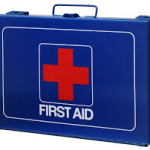 First aid kits are an important part of living safely and preparing yourself for a variety of medical problems. You should keep a first aid kit both at home and when you travel, carrying one in your car.
First aid kits are an important part of living safely and preparing yourself for a variety of medical problems. You should keep a first aid kit both at home and when you travel, carrying one in your car.
However, it’s not enough to just have a first aid kit. Do you have a good first aid kit? You have to make sure that you’ve stocked it with the right items.
Choosing the right supplies
Both the Mayo Clinic and the American Red Cross offer comprehensive lists of items to include in your first aid kit (the American Red Cross also suggests amounts of each item for a family of four). The two lists don’t perfectly overlap, so it’s advisable to consult both.
The items include a variety of sterile bandages and gauze pads, along with non latex gloves, soap, and hand sanitizer; when tending wounds, sterility helps reduce the chances of infection. The kit should include antibiotic ointment and a supply of medications that don’t need refrigeration, including pain relievers and allergy med’s (and, with your doctor’s recommendation and prescription, an EpiPen or another means of dealing with sudden severe allergic shock).
In addition to all of the medical supplies listed, be sure to include a flashlight, as you might need to administer medical intervention in a dark space. You should also have handy a list of phone numbers, including emergency numbers and your doctor’s number. If you’re traveling, the kit should include information about local medical facilities.
Performing regular kit maintenance
You have to periodically check your kit to make sure that it’s always prepared for use. Have any of the pills or ointments expired? Are you missing or running low on certain supplies? Does your flashlight still work, and are there extra batteries handy? Is the kit in its usual location or have you misplaced it?
Ideally, you’ll also understand how to use the items in the kit; getting basic first aid training is an important step. Even if you aren’t a doctor, using the supplies in a first aid kit can help stabilize a more serious problem or keep it from worsening until you can seek proper medical attention.







